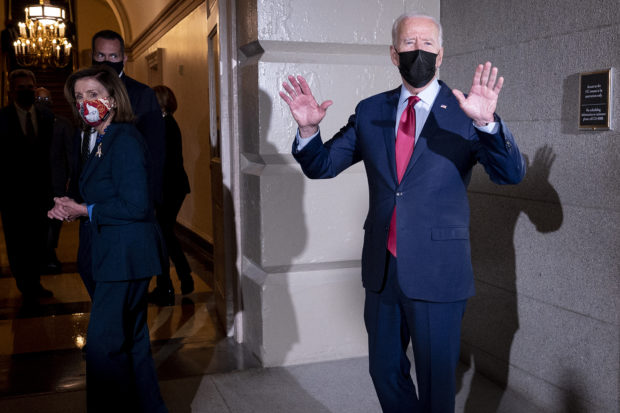As Democrats feud over historic spending plans, Biden vows to ‘get this done’

US President Joe Biden answers questions from the media as he walks with Speaker of the House Nancy Pelosi (L) upon departing the US Capitol after a caucus meeting in Washington, DC, on October 1, 2021. Biden headed to Congress to energize Democrats negotiating for a second day on getting his domestic spending agenda off the ground, or risk crippling political failure. The unusual presidential visit to Capitol Hill follows weeks of trips by party leaders in the other direction to the White House as Biden tries to get two ambitious spending plans passed into law. (AFP)
WASHINGTON, D.C. United States – President Joe Biden vowed Friday to get his sweeping domestic agenda over the line as he visited the US Congress to energize Democrats negotiating for a second day on twin make-or-break spending bills that could define his legacy — or spell crippling political failure.
“I’m telling you, we’re going to get this done,” he told reporters after meeting with House Democrats who are deeply divided on a spending spree that Biden says would restore America’s battered middle class.
“It doesn’t matter when. It doesn’t matter whether it’s in six minutes, six days or six weeks, we’re gonna get it done.”
The unusual presidential visit follows weeks of trips by party leaders in the other direction to the White House as Biden tries to get the two ambitious spending plans passed into law.
One would funnel $1.2 trillion into repairing infrastructure and the other would allocate even more for education, child care, and promoting clean energy.
“These are his proposals. These are his bold ideas,” Biden’s press secretary Jen Psaki told reporters.
“This is his plan that he’s outlined: to not just rebuild our roads, our railways and bridges, and put millions of people back to work, but also to make child care, elder care, (pre-school programs) more cost effective, to address the climate crisis. And he wants to make the case directly to members.”
Biden’s political legacy is at stake and so probably are the Democrats’ chances of keeping control of Congress in midterm elections next year.
However, on Thursday, a game of chicken between moderate Democrats and more leftwing members over the bills ended in stalemate.
Their razor-thin majority in Congress means that even a few defections could prevent votes from succeeding.
Nancy Pelosi, the leader of the fractious House Democrats, delayed a vote on infrastructure Thursday as congressional leaders arbitrated disputes among the party’s centrist and left groupings.
Trust issue
The impasse on the Democratic side is rooted in political differences over how much the government should spend, but also on the sheer lack of trust between competing factions.
On one side, moderate senators Joe Manchin and Kyrsten Sinema — popularly dubbed the “Manchinema” duo — refuse to back the proposed $3.5 trillion price tag for the social spending package.
They do, however, support something more modest, with Manchin proposing $1.5 trillion. They also have already voted in favor of the separate $1.2 trillion infrastructure bill.
Over in the House, a younger, fiery generation of more leftwing representatives insists on keeping the $3.5 trillion number for social spending, or at least something close.
And to maintain negotiating leverage, they are refusing to back the popular infrastructure bill, saying this can only come once they know they have a “yes” from the Democratic-controlled Senate for the social spending deal.
“If there’s something else that’s short of a vote, that somebody can offer me that gives me those same assurances, I want to listen to that,” Pramila Jayapal, chairwoman of the Congressional Progressive Caucus, told reporters, in a hint that the left might be willing to compromise.
“But right now I’m still saying we need a vote.”
Psaki said the administration’s outreach to congressional Democrats and their staff had included at least 300 phone calls or meetings since September 1.
During the 2020 campaign Biden repeatedly touted his dealmaking chops — established during his four decades as a senator — but he has made the journey up to Capitol Hill only rarely as president.
His in-person visit was a welcome development to rank-and-file Democrats who have been voicing hope he would get more deeply involved.
On Friday Pelosi must decide whether to try again for a vote on the infrastructure bill, despite the risk that progressives will kill it.
Alternatively, she could put everything on ice to buy time for crafting an overall agreement on the two bills.
There is no hard timeline for action on either bill, however, and Biden will not see the lack of progress as a defeat unless it starts dragging into the election year.
With a threatened government shutdown averted until December, the next urgent deadline is to raise the national debt limit ahead of the default date of October 18 — and there is still no plan on how to accomplish it.
Usually this is not a complicated issue. This year, though, Republicans are refusing to join Democrats in granting authorization, while Democrats argue they should not have to bear responsibility alone.
The standoff leaves the United States close to the cliff edge of a default on its $28 trillion debt, with the lack of progress expected to soon start raising pulses in the financial markets.